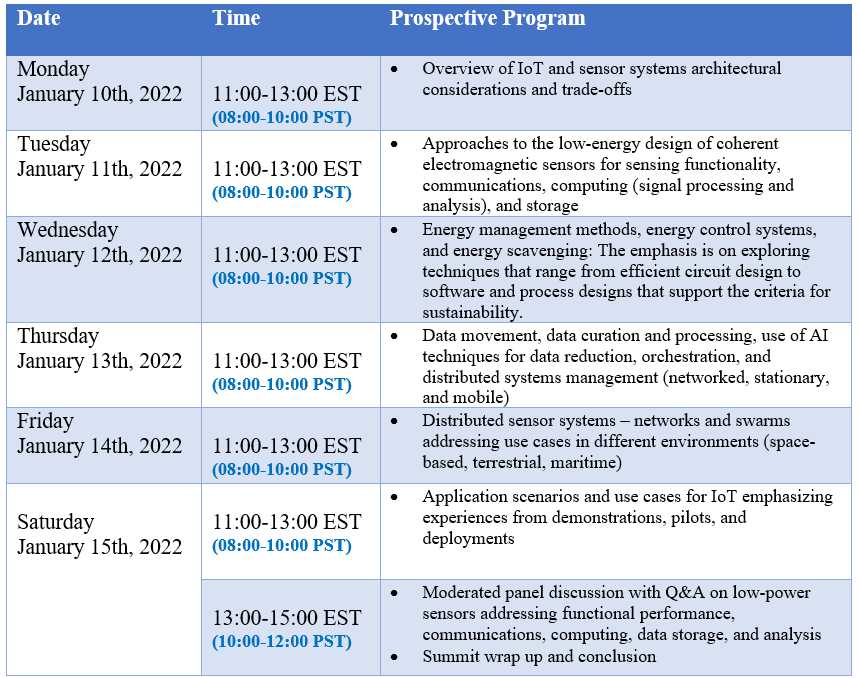The theme for the IEEE IoT V&T Summit at RWW2022 is:
“Sustainable Sensor Systems for IoT”
The 5th IEEE Internet of Things (IoT) Vertical and Topical Summit at RWW2022 addresses the crucial role that active and passive electromagnetic sensor systems play in IoT and where their design for sustainability is essential. Connected and networked sensors fulfill a critical purpose in many IoT applications and use cases, that range from radar sensors, to millimeter wave (mmWave) sensors, to the new technologies for mmWave and terahertz imaging to laser-based systems. Each use case brings application-specific requirements, but there is a large class of applications where electromagnetic sensors are essential, and sustainability is a fundamental requirement. In the context of IoT, the constraining factors on sensor and sensor systems are their expected longevity; sensor location and spatial distribution; the overall requirement for power at each site; the resources for sensing, power, connectivity, computing, and storage; and the ability to meet the functional performance as a system. The summit will explore approaches for creating sustainable sensor systems and networks, exploring energy-efficient hardware design, including management of energy for long-lived or remote sensor systems, the efficient methods for processing data from such systems, and finally, an examination of a wide range of use cases.
The term sustainability is broadly used to indicate programs, initiatives, and actions aimed at preserving particular resources. However, it refers to four distinct areas: human, social, economic, and environmental – known as the four pillars of sustainability [1]. At a specific level, for electromagnetic sensors, this can be translated into requirements that deal with the efficiency with which the sensors and accompanying systems utilize spectrum, the amount of power that the sensor systems consume. Also, this can be translated into how well the systems can be serviced, the economics of sensor deployment and operation that fit a broad set of use cases, and human factors that affect effective, safe, and beneficial use. This applies to the lifecycle of the sensor system, starting with an understanding of requirements, and includes sensor system design, development, deployment, operation, refreshment, and eventual retirement [2].
The upcoming summit aims to examine how sensor systems support sustainability and how emerging artificial intelligence (AI)-based processing methods can help with that. This includes the sensors themselves and the accompanying architectures, infrastructure, and systems necessary for creating value, such as communications, computing, data storage, and power. The further objective is to uncover the opportunities and challenges for such sensor systems across various applications in environments ranging from space to mobile platforms such as automobiles and uncrewed aerial vehicles (UAVs), ground-based rural and urban settings, and widely deployed personal mobile devices.
The summit is a six-day event designed to accommodate the new normal at the tail end of the Covid-19 pandemic. The summit is sponsored by the multi-society IEEE IoT Initiative and MTT. We have chosen to deliver the program in virtual two-hour sessions each weekday from January 10th to January 14th and two two-hour hybrid sessions (in-person and virtually) on Saturday, January 15th. Based on our experience with virtual programming for IEEE this makes it easier to attract participation from attendees around the World. The summit will be highly interactive, and each session is composed of three to four speakers and a moderated panel discussion with audience participation. For the final session on Saturday, we will be conducting a virtual roundtable discussion led by a moderator and use both prepared questions and open questions from the attendees. The summit seeks to provide a balance of perspectives, and the speakers include experts from industry, government, the research community, and experienced end-users. You can expect the presentations and discussions to address technical, business, and operational issues.
Speakers
The majority of the speakers for the summit are chosen by invitation. However, we will also accommodate a limited number of additional speakers whose presentations address the subjects we have listed above and whose proposals for presentations are in line with the theme of the Summit. If, you wish to submit a proposal for inclusion in the Summit, please follow the instructions on the Summit Website. We require all speakers and attendees to register for the Summit. Submissions for talk ideas should be directed to:
Jasmin Grosinger, jasmin.grosinger@tugraz.at
Charlie Jackson, Charles.M.Jackson@ngc.com
Adam Drobot, adam.drobot@gmail.com
Outline
The specific areas that the two-hour sessions will be addressing include but are not limited to the following:
Program
The website and program for the upcoming summit and as well as presentation material from past summits can be found through:
https://rww2022.iot.ieee.org/program/ – Las Vegas, NV – RWW2022 program and presentations
https://rww2021.iot.ieee.org/program/ – San Diego CA – RWW2021 program and presentations
https://rww2020.iot.ieee.org/program/ – San Antonio TX – RWW2020 program and presentations
http://rww2019.iot.ieee.org/program/ – Orland FL – RWW2019 program and presentations
http://sites.ieee.org/rww-2018/program/ – Anaheim CA – RWW2018 program and presentations
If you are a policy maker, a strategist, a corporate manager, administrator, product developer, an IoT or mmWave engineer, a technologist, researcher, educator, working in industry, government, or academia, or just curious about IoT, wireless sensors, and communications systems, you will find the summit stimulating and rewarding. We look forward to having you join us virtually online January 10th through 14th, 2022, and participating in the hybrid portion of the event on January 15th, 2022. See you online and hopefully in Las Vegas!
References
[1] https://en.unesco.org/themes/education-sustainable-development/what-is-esd/sd
[2] Wilson, Denise, “Sustainability in Sensors and Sensor Systems.” IEEE Sensors 2016, Orlando, FL, October 30th, 2016.



